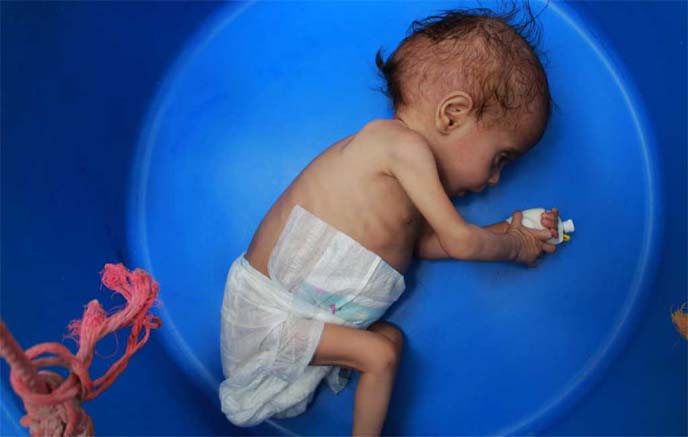
Reuters :
Climate change could undo decades of work reducing malnutrition, scientists said on Thursday in a study finding that children in developing countries with rising temperatures are eating poorer diets.
Higher temperatures often had a bigger impact on children’s diet diversity than the gains seen from access to education, clean water and poverty reduction, said the U.S.-led study in the journal Environmental Research Letters.
“This is deeply concerning; it indicates that in many regions these positive socioeconomic and demographic changes may not be adequate to outweigh the negative effects of a changing climate going forward,” the study said.
“Warming temperatures and increasing rainfall variability could have profound short- and long-term impacts on child diet diversity, potentially undermining widespread development interventions aimed at improving food security.”
Some 144 million children worldwide are stunted by malnutrition and face a future of ill health, poor education, low earnings and poverty, according to the United Nations children’s fund UNICEF, a number which has been falling.
Led by scientists from the University of Vermont, the largest global study of links between children’s diet diversity and climate looked at children aged five and under in 19 countries across Asia, Africa, South and Central America.
In five out of six regions, they found significant reductions in children’s diet diversity when there were higher temperatures – either long-term heat or above average temperatures in the year of the survey or the prior year.
“Future climate changes have been predicted to affect malnutrition,” said lead author Meredith Niles, an assistant professor of nutrition and food sciences at the University of Vermont in a statement.
“But it surprised us that higher temperatures are already showing an impact.”
Household wealth was the biggest single predictor of diet variety. Researchers found that children ate on average 3.2 food groups out of 10 possible in the 24 hours before the survey – half that of children in more affluent countries such as China. There was also good news.
Higher than average rainfall both over the long-term and in the previous year was linked to access to a wider variety of foods in West and Southeast Africa and Central America.
Paolo Vineis of Imperial College London, who has studied the effects of climate change on diseases and was not involved in the study, said worsening diets could also be linked to changes in agriculture an the food industry, not just climate change.
Climate change could undo decades of work reducing malnutrition, scientists said on Thursday in a study finding that children in developing countries with rising temperatures are eating poorer diets.
Higher temperatures often had a bigger impact on children’s diet diversity than the gains seen from access to education, clean water and poverty reduction, said the U.S.-led study in the journal Environmental Research Letters.
“This is deeply concerning; it indicates that in many regions these positive socioeconomic and demographic changes may not be adequate to outweigh the negative effects of a changing climate going forward,” the study said.
“Warming temperatures and increasing rainfall variability could have profound short- and long-term impacts on child diet diversity, potentially undermining widespread development interventions aimed at improving food security.”
Some 144 million children worldwide are stunted by malnutrition and face a future of ill health, poor education, low earnings and poverty, according to the United Nations children’s fund UNICEF, a number which has been falling.
Led by scientists from the University of Vermont, the largest global study of links between children’s diet diversity and climate looked at children aged five and under in 19 countries across Asia, Africa, South and Central America.
In five out of six regions, they found significant reductions in children’s diet diversity when there were higher temperatures – either long-term heat or above average temperatures in the year of the survey or the prior year.
“Future climate changes have been predicted to affect malnutrition,” said lead author Meredith Niles, an assistant professor of nutrition and food sciences at the University of Vermont in a statement.
“But it surprised us that higher temperatures are already showing an impact.”
Household wealth was the biggest single predictor of diet variety. Researchers found that children ate on average 3.2 food groups out of 10 possible in the 24 hours before the survey – half that of children in more affluent countries such as China. There was also good news.
Higher than average rainfall both over the long-term and in the previous year was linked to access to a wider variety of foods in West and Southeast Africa and Central America.
Paolo Vineis of Imperial College London, who has studied the effects of climate change on diseases and was not involved in the study, said worsening diets could also be linked to changes in agriculture an the food industry, not just climate change.

